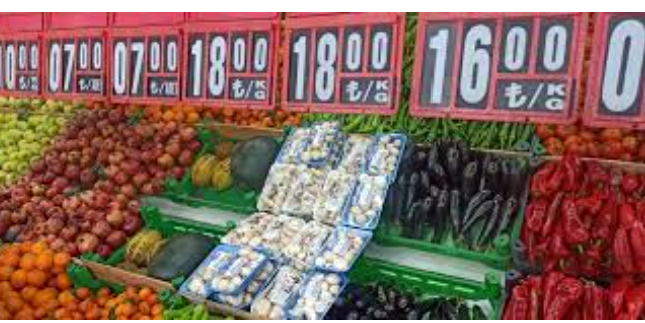According to the July inflation data announced by the Turkish Statistical Institute (TurkStat), the annual inflation rate rose to nearly 50 percent. Among the food products with the highest price surge, vegetables have the lead by 20.1 percent and fresh fruits by 15.7 percent. This is highly unusual in a country where plentiful fresh produce depress inflation in summer and fall months. Yet, years of neglect in boosting agricultural output, coupled with global warming which triggered another devastating draught this summer and finally the pressure from global commodity prices are changing this pattern. On top of these fundamental concerns, inflation expectations are running among, which means food has become a sellers’ market in Turkey.
In a marketplace in the capital Ankara’s 100 Yil neighborhood, both customers and sellers are dissatisfied with the prices.
Ege Ozcan, a customer in his twenties, told Xinhua that compared to previous weeks, a fresh rise is on price tags in the market. “We have to cut back on everything, from social activities to buying food products,” he complained.
Erdogan Atas, a disillusioned watermelon seller, said that “we, as vendors, have difficulty selling our products as clients cannot afford them because of food inflation.” “The price of watermelons has risen between 100 and 130 percent,” he said, adding that the rising costs of farming have caused prices to soar.
According to the TurkStat, food prices have increased by 54 percent annually in Türkiye, a rise which has been continuing for 34 consecutive months, since August 2020.
Meanwhile, the Turkish central bank projected the inflation rate for food prices to reach 61 percent at the end of 2023.
Ali Ekber Yildirim, a journalist and author specializing in agricultural industry, said on his video blog that sudden temperature changes this year have harmed the production and quality of many crops, especially tomatoes, of which Türkiye is a big producer. “The crops deteriorated due to excessive rainfall and extreme heat,” he explained.
Rising gasoline and diesel prices increased costs not only in production but also in transportation, and thus made food more expensive.
Along with the fluctuation in foreign exchange, fertilizer prices have increased by up to 33 percent in July, Semsi Bayraktar, president of the Union of Chambers of Agriculture of Türkiye, said in early August.
“Food prices will continue to rise in the current conditions,” he warned.
To deal with challenges posed by the climate crisis, Türkiye’s Agriculture and Forestry Minister Ibrahim Yumakli announced plans to implement policies that aimed at improving agricultural production and supporting producers and protect consumers.
The government have promised agricultural reform for over a decade, which only amounted to punishing supermarkets for charging exorbitant prices. Supermarket chains bowed to government demands on cutting margins, but punished suppliers along the food chain, at the bottom of which is Turkey’s poorly organized, ands undercapitalized farmers and peasants. According to government stats, more than 21 million hectares lay fallow, as farmers migrate to cities for a better life.
According to World Bank’s latest report on food prices,
Although global food commodity prices fell in the first quarter of 2023 compared to the previous year, many regions experienced a rise in domestic food prices. Local food prices increased by 10.1 percent in the first half of 2023 (year on year) in half of emerging markets and developing economies.
READ: Turkey in the throes of a devastating drought, once again
High food price inflation was more prevalent in Europe and Central Asia (ECA), with more than 16.7 percent observed in half of the countries in the region.
Some countries experienced extreme inflation in the second half of 2023. For example, food price inflation exceeded 100 percent in Argentina, Lebanon, Venezuela, and Zimbabwe and was over 30 percent in many countries.
High food price inflation is a significant concern for emerging and developing economies, as food makes up a third of households’ expenses.
Turkish experts fear the hostilities in Black Sea will push up soya, wheat and fertilizer prices, of which Turkey is a large importer.
The rekindling of food inflation comes at the worst time for Erdogan whose AK Party will have to contest a crucial March 2024 local election. According to pro-government columnist Abdulkadir Selvi of Hurriyet, an AKP survey found 50% of participants consider the economy the most important concern.
Xinhua, World Bank blog, Cuneyt Akman (PA Turkey)
Follow our English language YouTube videos @ REAL TURKEY: https://www.youtube.com/channel/UCKpFJB4GFiNkhmpVZQ_d9Rg
And content at Twitter: @AtillaEng
Facebook: https://www.facebook.com/realturkeychannel
